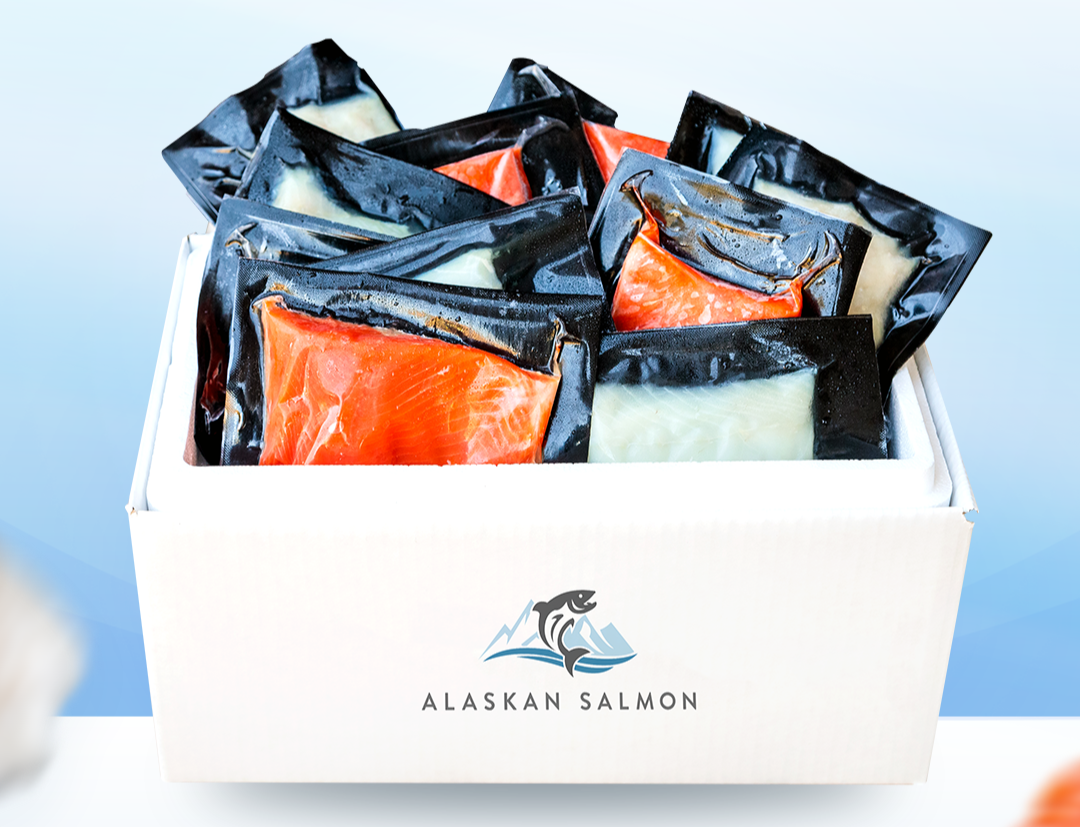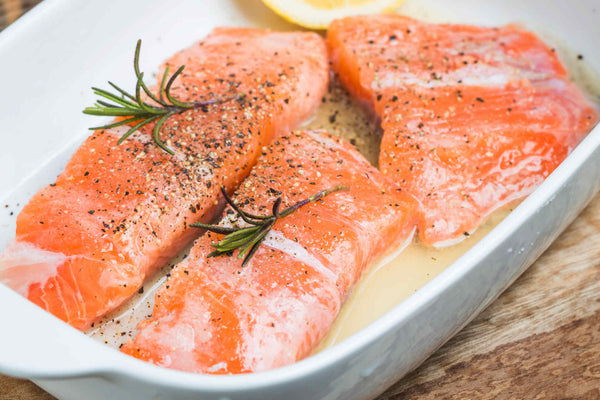How Long Should You Marinate Salmon Before Cooking?
Updated on Oct 29, 2025
Marinating salmon can take your dish from simple to flavorful, but figuring out how long to let it sit can be tricky. Leave it too short, and the flavor won’t have time to develop. Leave it too long, and the fish can become soft or even mushy, especially if your marinade contains lemon juice or vinegar.
Finding the right marinating time depends on your ingredients and cooking method. Whether you’re grilling, baking, or pan-searing, knowing how long to marinate salmon helps lock in flavor while keeping that perfect tender texture.
Here’s what you need to know before your next salmon dinner!
How Long to Marinate Salmon
Marinating salmon isn’t an exact science, but general guidelines can help you get it right every time. Most of the flavor develops within 30 minutes, though some marinades can safely stay on for up to an hour.
Beyond that, things start to get tricky — the texture of your salmon can change depending on what’s in your marinade and how thick your fillet is.
Three main factors influence how long you should marinate salmon:
- The ingredients in your marinade (especially if it contains acid)
- The absence of acid (which gives you more flexibility)
- The size and thickness of your salmon
Let’s take a closer look at how these come into play:
Marinades with acid
If your marinade includes acidic ingredients like lemon juice, lime juice, vinegar, or even yogurt, keep your marinating time short — about 20 to 30 minutes. Acids start to “cook” the salmon, much like what happens when making ceviche, and leaving it too long can make the flesh soft or flaky before it even hits the heat.
Examples of acidic marinades include:
- Lemon-garlic with olive oil and herbs
- Soy sauce with rice vinegar and honey
- Greek yogurt with dill and lemon zest
When in doubt, a quick soak is enough to brighten the flavor without breaking down the texture.
Marinades without acid
If your marinade is oil-based or made mostly with herbs, spices, soy sauce, or butter, you can marinate the salmon a bit longer — up to 1 hour in the fridge. Without acid, the fish won’t “cook” prematurely, giving flavors more time to blend and soak in.
Examples of non-acidic marinades include:
- Olive oil with garlic and smoked paprika
- Teriyaki-style soy and brown sugar mix
- Herb butter with minced garlic and black pepper
For thicker salmon fillets, you can even push closer to the one-hour mark, while thinner pieces will do just fine with 30 minutes.
Size of the salmon
The thickness and size of your salmon fillet also play a big role in marinating time. Thicker cuts have more surface area and more flesh for the marinade to penetrate, which means they benefit from a slightly longer soak. Thin fillets, on the other hand, can absorb flavors quickly and are more prone to over-marinating.
Here’s a simple guide:
- Thin fillets (about 1 inch or less): 20–30 minutes is plenty, especially with acidic marinades.
- Medium fillets (1–1.5 inches): 30–45 minutes works well.
- Thick fillets or whole sides (over 1.5 inches): Up to 1 hour is safe, particularly with non-acidic marinades.
Always marinate salmon in the refrigerator to keep it fresh and safe.
Marinating Salmon Based on Cooking Method
The way you plan to cook your salmon affects how long you should marinate it and which marinades work best. Different cooking methods influence how the flavors soak in and how tender the fish stays.
Grilling
Grilling salmon gives it a smoky, charred flavor, but high heat can quickly dry out the fish. For this reason, marinate for 20–30 minutes, especially with acidic marinades, to prevent the fish from becoming too soft. Oil-based marinades work well to keep the salmon moist and help prevent sticking to the grill grates.
Baking
Baking is gentler, allowing flavors to soak in evenly. You can marinate salmon for 30–45 minutes, and even slightly longer for non-acidic marinades. Baking in foil or parchment paper locks in moisture and intensifies the flavors you’ve marinated into the fish.
Pan-searing
Pan-searing cooks salmon quickly and gives it a crispy exterior. Because cooking time is short, a 20–30 minute marinade is ideal. Focus on a marinade that enhances flavor without overpowering the delicate salmon, such as garlic, herbs, or a light soy-based mix.
Air-frying
Air-frying is fast and efficient, producing a crispy finish with minimal oil. Keep marinating times on the shorter side, around 20–30 minutes, to ensure the salmon doesn’t become too soft. Light, oil-based marinades work best to promote browning and crisp edges.
Best Practices for Marinating Salmon
To get the most flavor without compromising texture, follow these tips:
-
Always marinate in the fridge – Salmon should never sit at room temperature while soaking in a marinade, both for safety and to maintain firm texture.
-
Time it right – Stick to recommended marinating times based on acidity, thickness, and cooking method. Over-marinating is a common mistake that can ruin your fillet.
-
Pat dry before cooking – Removing excess marinade helps the fish sear or grill properly, producing a better crust and caramelization.
- Experiment with flavors – Don’t be afraid to combine herbs, spices, and oils in ways that suit your taste. Small adjustments can make a big difference.
Mistakes to Avoid When Marinating Salmon
Even experienced cooks can make simple mistakes that affect flavor and texture. Here’s what to watch for:
-
Marinating too long – Acidic ingredients can “cook” the salmon, making it mushy. Stick to the recommended time frames.
-
Using too much acid – Even a short soak can overpower salmon’s natural flavor if the marinade is too strong. Balance is key.
-
Not considering fillet thickness – Thin fillets absorb flavors quickly, while thick fillets need more time. Adjust accordingly.
-
Leaving marinade on at room temperature – This can encourage bacteria growth and affect the quality of the fish. Always refrigerate.
-
Not drying before cooking – Excess marinade can prevent proper searing or grilling, which can to uneven texture or splattering.
Summary
Marinating salmon is all about balance — enough time for flavors to sink in, but not so long that the fish becomes mushy. Considering the type of marinade, the thickness of your fillet, and your cooking method helps create perfectly flavorful salmon every time.
For an elevated experience, try wild-caught options from the Alaskan Salmon Company. Our Sockeye Salmon and King Salmon are packed with rich flavor and firm texture, which makes them ideal for marinating and grilling, baking, or pan-searing.
Experimenting with these premium cuts can turn a simple dinner into a memorable meal that impresses family and friends.
FAQs
Does marinating salmon tenderize it?
Marinades can slightly tenderize salmon, especially those with acidic ingredients like lemon or vinegar, but their main purpose is to enhance flavor. Too much acid, however, can make the fish overly soft, so timing is key.
Can you marinate salmon too long?
Yes. Over-marinating salmon, particularly in acidic mixtures, can break down the proteins too much, resulting in a mushy texture. Stick to 20–30 minutes for acidic marinades and up to an hour for non-acidic ones, depending on fillet thickness.
Should I rinse off the marinade before cooking?
It’s usually best not to rinse. Gently pat the salmon dry with paper towels to remove excess liquid. This ensures a nice sear or grill without washing away the flavors you just worked to infuse.








